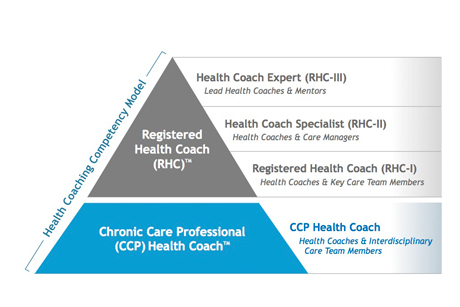About Registered Health Coach
Up to 85% of avoidable health costs and most disability are due to health behaviors. Fortunately there are some brief, best practice approaches for engaging at-risk individuals and facilitating better health. Compared to traditional patient education or popular health coaching approaches, validated approaches consistently deliver better patient-level outcomes in real-world health care settings.
In health coaching, like any health care field, best practices are defined when trained and credentialed specialists review the clinical research and define effective interventions. Practitioners are then trained in these approaches and practitioner knowledge, proficiency and adherence to best practices is measured. This was the process used to develop and validate the Registered Health Coach (RHC)® program.
The First Health Coaching Credential based on Science, Proficiency & Outcomes
The Registered Health Coach (RHC) program is the first health coaching credential grounded in the science of health behavior change and learning. The RHC program was developed in partnership with experts in the field--including NIH-funded health coaching and behavioral medicine specialists. RHC also reflects ten years of experience at HealthSciences with some of the largest public and private health care organizations in the US and Canada.
Making a Measurable Difference for Patients & Purchasers
While Registered Health Coaches come from various clinical or nonclinical fields and settings, they share knowledge and proficiency in brief, highly effective approaches for engaging people at risk of, or affected by chronic conditions--and facilitating disease self-care, treatment adherence and lifestyle management. In fact, HealthSciences Institute faculty have demonstrated that health coaches who have been prepared and tested proficient in validated health coaching approaches can deliver four-fold improvements in engagement vs. practictioners who are less proficient in multinational employer settings.
A Pathway to Proficiency & National Recognition
The Registered Health Coach Program recognizes excellence and provides a pathway for building health coaching knowledge and proficiency. Registered Health Coaches are included in a PartnersinImprovement® national online Health Coach Registry®. The registry is searchable by consumers, employers and purchasers. Organizations who require Registered Health Coaches are also recognized for quality.
 RHCs Have Completed a Core Curriculum in Chronic Care & Health Coaching
RHCs Have Completed a Core Curriculum in Chronic Care & Health Coaching
A Registered Health Coach must complete a core curriculum in evidence-based population health management, chronic care and self-care support, wellness and lifestyle management using brief, motivational interviewing (MI)-based health coaching. This requirement is based on the recommendations of the Institute of Medicine as well as peer-reviewed studies on implementation success factors for the Chronic Care Model (CCM).
RHCs Are Proficient in Motivational Interviewing (MI) in Health Care
MI is the only health coaching approach that consistently delivers better patient-level outcomes in over 300 clinical trials. RHC training requirements are based on the validated training recommendations of the Motivational Interviewing Network of Trainers (MINT) and proficiency is measured with an externally validated tool for assessing MI health coaching proficiency.
How Do I Learn More?
In February 2012, Dr. Susan Butterworth, a lead contributer to the development of the HCPA and RHC program, hosted a webinar session overviewing the program. Please view now: Becoming a Registered Health Coach (RHC): Your Pathway to Proficiency & National Recognition. If you have further questions please submit a technical support form.
